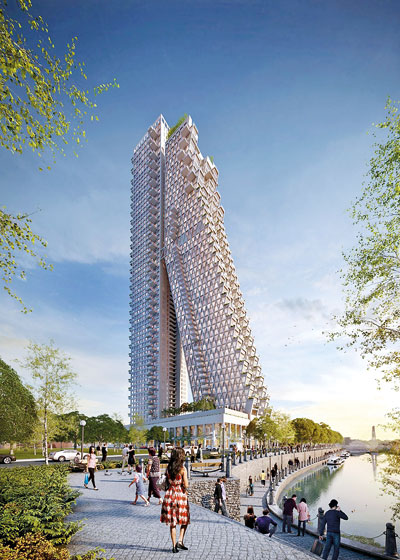CB seeks details of apartment sales from high rise builders
View(s):
The Central Bank (CB) is seeking details of apartment sales, revenue, etc from the builders in a bid to ascertain a ‘clearer’ picture of the industry’s direction and to forestall any likely real estate bubble, CB sources said.
This was requested by CB officials at a meeting with high-rise developers, two months ago. This meeting came after comments by CB Governor Indrajit Coomaraswamy on apartment sector bubbles. The apartment sector has been flooded with cash in recent years from a wide variety of investors and many of them larger players.
Dr. Coomaraswamy told reporters in May that the apartment construction industry appeared to be overheating, was using credit lines meant of SMEs, and was a channel for black money.
He noted that the regulator is watching the real-estate sector due to excessive credit generating a property bubble. This was due to low interest rate (in home loans etc) some three years ago which channeled cash into this sector, he said.

Artist's impression of the Altair development
This statement saw many in the industry retaliating. “I know we are living in a post truth world, but some of the broad generalisations made by the Governor are excessive, precipitous and don’t seem to be grounded in established facts,” said Hemaka de Alwis, Chairman of Fairway Holdings in a subsequent statement. There are impressive increases in the apartment industry that have stoked a long-running debate about the sustainability of Colombo’s high rise prices but defenders claim that price increases result from rising incomes meeting supply constraints in desirable areas, while detractors see a bubble with major risk of popping.
While there were no plans to place credit restrictions, the CB is closely monitoring the industry, officials said at the meeting. They will issue directions to credit lending institutions accordingly. According to CB the apartment bubble has not burst, but changed shape.
A recent study by HSBC said that some 60 per cent of apartment buyers were in the ‘buy and sell’ category, 25 per cent were locals residing abroad while only 15 per cent really lived in apartments they bought. It said that the luxury condo boom in Colombo was fuelled by businessmen and deal-makers with unexplained wealth.
Despite 2/3 of the population living on 1/3 of the land area around the Western Province, Sri Lanka is one of the least urbanised countries in the world. In fact Sri Lanka’s urbanisation rate of 20 per cent is well behind the average for South Asia and half that of the global average. The UN World Urbanisation Index of 2011 puts Sri Lanka at 199 out of 203 countries.
The CB expects that by year end, given current policies and if the government fiscal outlays stay pretty much on track, the private sector credit would come down to 18 per cent, Dr. Coomaraswamy has said.


